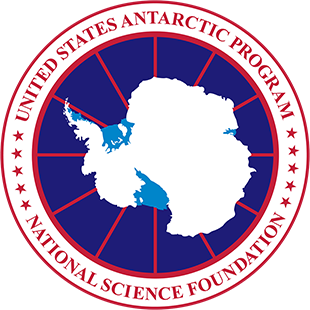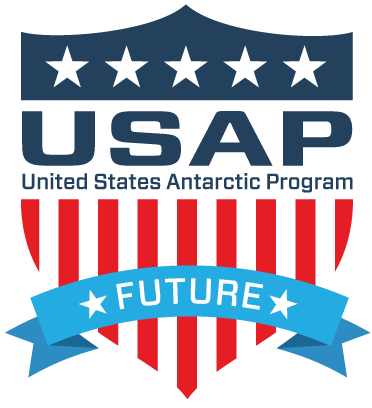Thank you for visiting the Future USAP website. Please note that we collect no personal information about you when you visit our website unless you choose to provide that information to us.
If you are simply visiting Future USAP to browse through our site, read pages, or download information, we will gather and store certain information about your visit automatically. This information does not identify you personally. We automatically collect and store only the following information about your visit:
- The Internet domain (for example, “xcompany.com” if you use a private Internet access account, or "yourschool.edu" if you connect from a university’s domain) and IP address (an IP address is a number that is automatically assigned to your computer whenever you are surfing the Web) from which you access our website;
- The type of browser and operating system used to access our site;
- The date and time you access our site;
- The pages you visit; and
- If you linked to the USAP site from another website, the address of that website.
We use this information to help us make our site more useful to visitors — to learn about the number of visitors to our site and the types of technology our visitors use. We do not track or record information about individuals and their visits.
If you request information or services or submit comments to the National Science Foundation about Future USAP and submit personal information to facilitate response to your request, we use the information provided to respond to your message. We will not share the information you give us with another government agency unless your inquiry relates to that agency, or as otherwise provided by law. We do not create individual profiles with the information you provide or collect information for commercial marketing.
Cookie Policy
While attempting to view certain information on this site, you may receive a notice stating that a particular feature requires a cookie for functionality. This site uses session cookies that record only statistical information such as the number of repeat customers we receive. These session cookies do not store any personally identifiable information, and they cannot be read by servers outside of the USAP.gov domain. When you receive the cookie acceptance notice, you can refuse to accept the cookie, and still have access to the web page; however, some features may not properly function. This site also uses cookies to for metrics and demographics purposes, including:
- To get aggregate metrics on site usage to understand how people are using the site and how we can make it better. We use web metrics services to track activity on Future.USAP.gov. Government agencies only ever receive traffic statistics anonymously and in the aggregate.
- To gather anonymous summary demographic information about our visitors such as gender, age range, and areas of interest for adults over the age of 18. We do this by using Google Demographic and Interests reports. When you visit a website that has partnered with the Google Display Network, Google stores a number in your browser using a persistent cookie to remember your visits. This number uniquely identifies a web browser, not a specific person. Browsers may be associated with a demographic category, such as gender or age range, based on the sites that were visited. This demographic information is used to help us better understand our visitors’ interests and needs to more effectively develop content to serve you.
The NSF USAP policy on cookies prohibits USAP websites from setting cookies without notifying the user. One exception occurs when USAP websites use third party hosting services for content that enforce the privacy and cookie policies for the hosting provider. Please see Linking Policy below for more information.
Linking Policy
To provide an abundance of information for users, the Future USAP website links to many websites created and maintained by other organizations. Wherever possible, Future.USAP.gov will provide a notification when clicking a link that leaves the Future USAP website. When users utilize these links, they are leaving Future.USAP.gov and are subject to the privacy and security policies established by those organizations.
Future.USAP.gov utilizes the following third party hosting sites for multimedia services integral to its functioning. Due to technical complexities, the notification cannot be provided. The link for the associated third party privacy policy is provided.
| Third Party Site | Site Privacy Policy |
|---|---|
| Vimeo |
https://vimeo.com/privacy https://vimeo.com/cookie_policy |
Linking to Us
The Future USAP website and the USAP web portal are official sites for the United States Antarctic Program, which is managed by the National Science Foundation’s Office of Polar Programs. You may link to USAP.gov and Future.usap.gov at no cost; however, if you link to the site, you are obligated to follow certain guidelines:
Logos and Graphics
When providing a link to the Future USAP website or USAP web portal, you are encouraged to use the Future USAP and USAP logos. All graphics on the websites are free to the public; however, the National Science Foundation as well as the photographer must be credited.
To use the USAP logo or Future logo on your website:
- Place your mouse over the image below, or click the image to open a larger version.
- Right-click on the image.
- Choose Save picture as….
Select a location on your device and click the Save button.
If you use text to describe the USAP web portal, please use the following:
Short Description of the Future USAP website
The Future USAP website is the official site for the United States Antarctic Program's Future USAP modernization effort.
Long Description of the Future USAP website
The Future USAP website is a part of the United States Antarctic Program (USAP), run by the National Science Foundation (NSF). Future USAP is dedicated to long range investments in Antarctic infrastructure spread across three major stations on the continent: McMurdo, Palmer, and South Pole.
Using Text from the Future USAP website or the USAP Web Portal
If you copy and reproduce any text from the Future USAP website or the USAP Web Portal, you are required to follow copyright laws as defined in the 1976 Copyright Act.
Social Media Policy
NSF uses social media to enhance communication and engage with our stakeholders and with the public. Our use of social media is in keeping with the goals of open government (transparency, public participation and collaboration), and it is consistent with the agency’s mission "to promote the progress of science; to advance the national health, prosperity, and welfare; [and] to secure the national defense."
NSF has agreements with a number of social media platforms, including Facebook, Twitter, YouTube, Flickr and LinkedIn. NSF has a complete list of their social media activities, and we encourage you to visit these sites and share your thoughts.
Images and videos on NSF’s social media sites, other than those credited to NSF, may be subject to copyright and should not be used without permission from the copyright holders.
GENERAL DISCLAIMER
Any opinions, findings, conclusions or recommendations presented on our social media platforms are only those of the presenter grantee/researcher, author, or agency employee; and do not necessarily reflect the views of the National Science Foundation. The NSF website has more official information about NSF.
PRIVACY
The NSF Privacy Policy applies to the NSF website but not to our external social media platforms. They have their own privacy policies that visitors should be aware of. Links to the privacy policies of our social media platforms are as follows:
- Facebook privacy policy
- Flicker privacy policy
- Ideascale privacy policy
- LinkedIn privacy policy
- Pinterest privacy policy
- Storify privacy policy
- Tumblr privacy policy
- Twitter privacy policy
- Vine privacy policy
- WordPress privacy policy
- YouTube privacy policy
FREEDOM OF INFORMATION ACT
As contracted by the National Science Foundation (NSF), the USAP follows policy to make the fullest possible disclosure of information, subject to restrictions imposed by the Freedom of Information Act (FOIA) and Privacy Act, to any person who requests information, without unnecessary expense or delay. For more information on how to make FOIA and Privacy Act requests for NSF-owned records and how to contact the FOIA and Privacy Act offices at the NSF, see the NSF FOIA page.
INFORMATION QUALITY GUIDELINES
For compliance issues relating to section 515 of the Treasury and General Government Appropriations Act for Fiscal Year 2001 (Public Law 106-554), see the NSF Information Quality Guidelines (on the NSF Data Quality Standards page).
INFORMATION ABOUT REGULATIONS
In compliance with the President’s Management Agenda, National Science Foundation regulations and the associated contacts are available on the NSF Policy and Guidance page. There is additional information available on how to find, review, and submit comments on Federal documents that are open for comment and published in the Federal Register (the Government’s legal newspaper).



